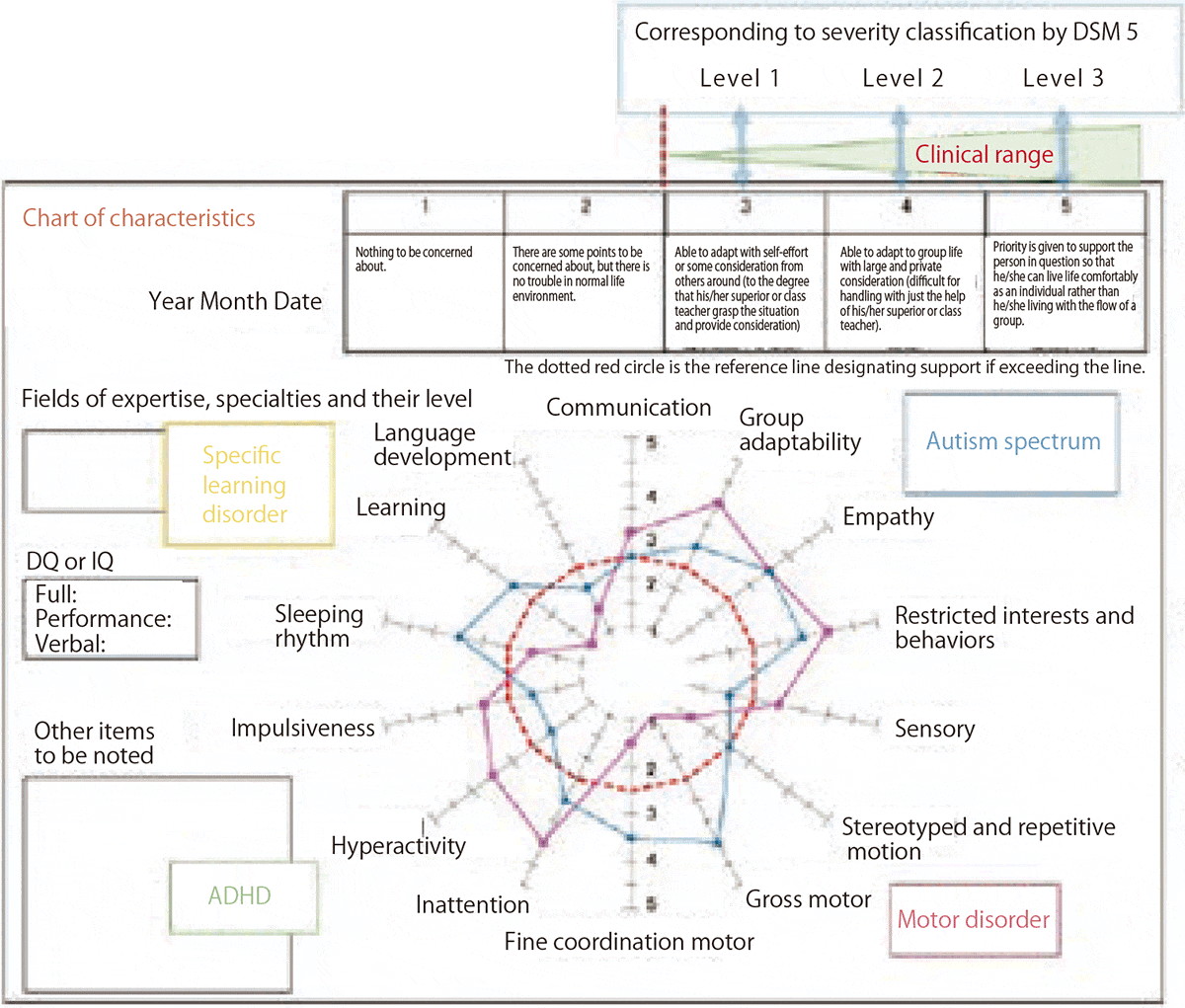Research Results
Aiming to expand the support network
Evaluate the level of support required for individuals with developmental disabilities FY2017

- Yasuko Funabiki (Associate Professor, Graduate School of Human and Environmental Studies, Kyoto University)
- RISTEX
- Implementation-Support Program (R&D results integrated Type)
"Practical Utilization of Multi-dimensional Scale for PDD and ADHD (MSPA) across the Medical, Education and Social Field" Representative (2014-2017)
Evaluation of the level of support required for individuals with developmental disorders who are difficult to support
There are people who have certain characteristics in a part of the brain function from birth, and thus have difficulty in their social life because they cannot communicate with others well or have some tendencies in their behaviors. These people are called"developmental disabilities."
This developmental disorder is a innate trait and different from a disease. Therefore, if they have appropriate support, such as being treated in the proper way and having supportive environ- ment, the obstacles in their social life can be reduced. However, if they are left without appropriate understanding, they may fail to build good interpersonal relations at school or work, and it may result in becoming the cause of bullying or mental diseases (mental disorders) such as depression, neurosis and so on. In many cases, developmental disorders can be found in their child- hood. Thus, the key is to support these people in early stages.
However, neurodevelopmental disorders are categorized into some types such as autism, Asperger's syndrome, attention-defi- cit/hyperactivity disorder (ADHD), learning disorder, and tic disorder. Each person usually has multiple types simultaneously. Their appearances can also vary. Thus, it is difficult to establish a standard for the evaluation regarding to what extent their sup- port is required. It is also difficult to have common understand- ing between staffs from various kinds of occupations such as a doctor, psychologist, psychiatric social worker, occupational ther- apist, researcher and others, as well as between different regions, consequently, the support network is not easily extended. In 2004, Act on Support for Persons with Developmental Disabilities was established, and the frameworks of establishing a support center, support system based on a medical certificate have been arranged. However, support for individual differences has been scarce due to difficulty of understanding their overlapping traits of developmental disorders.
In order to solve this problem, Associate Professor Yasuko Fun- abiki developed Multi-dimensional Scale for PDD and ADHD (MSPA), which is an evaluation scale for the degree of needed support for developmental disorders. If this evaluation tool can be widely used in actual society, such as in the fields of medicine, education and others, the evaluation standards can be unified into one, so that the people concerned can extend their support network. JST has supported the efforts of Associate Professor Yasuko Funabiki et al. through the "Implementation-Support Pro- gram (R&D results integrated Type)" of Research Institute of Science and Technology for Society (RISTEX), which has utilized and developed R&D results to support attempts for solving spe- cific problems in society.
Evaluating the features s using nine-rank scale and displaying it with a radar chart
MSPA is an evaluation scale in which the level of support required for developmental disabilities with large inter-indivi duals differences is each assessed precisely according to their ch aracteristics. It displays the result with a radar chart; thus, t he individuals and those in their surroundings are able to understand it at a glance. Although existing assessment tools for a medical examination mainly focus on the validity of the diagnosis,, MSP A is characterized by its aim at actual support. Specifically, it evaluates and illustrates the level of required support for developmental disabilities in nine stages in each trait. This comprehensive multi-axial evaluation enables easy understanding of the support directly connected to the needs in actual life.
If this assessment scale is utilized widely, it can be expected to produce various effective results. For example, the standard of support for various kinds of developmental disabilities can be equalized. Additionally, if this evaluation method is set as the basis, a common understanding can be established for coopera- tion with people from various occupations or other districts. It can also help to accelerate support or reduce its waiting period. Furthermore, it is believed that it can result in relieving social problems (e.g., bullying, reclusiveness, work problems), and making it easier to increase and help supporters through pro- moting the understanding of developmental disorders. In addi- tion, it is expected that the evaluation will lead to the prevention of secondary illness such as depression and neurosis. It is also expected that the evaluation will be helpful in reducing preju- dice because it does not use the expression, "disorder."
"Multi-dimensional Scale for PDD and ADHD (MSPA)"
【Outline】
Assessing the level of support required by the traits of developmental disabilities with various symptoms and large inter-individuals differences , rating on a 9-point scale, and displaying it with a chart

【Comparison to the existing evaluation tools】
• Existing evaluation tools mainly aim at increasing the validity of diagnosis.
• Since this scale focuses on support, it features a comprehensive multi-axial evaluation, which is directly connected to the needs in actual life.
【Effectiveness】
The following effects are expected, and economy effect is also generated through enhancing intangible aspect comprehensively.
• Equalizing the support level
• Accelerating support ("common language" among various job types and areas)
• Reducing the waiting period
• Increasing supporters (promotion of understanding developmental disorder)
• Relieving social problems (declination of birth rate, bullying, reclusiveness, work
issues, etc.)
• Preventing secondary damage (depression, neurosis, etc.)
• Reducing prejudice (explanation using characteristics without description as "disorder")
【Handling of remuneration】
• 450 scores (need of expert knowledge due to the comprehensive multi-axial evalua- tion for developmental disorder)
• Expert staffs (psychologist etc.) can also perform this based on requirement from doctors.
【Method】
• Interview (hearing the developmental history and daily life from the individual and caretaker. In general, however, an interview with the person himself/herself is must.)
Utilizing MSPA in the actual educational and medical fields
In order to solve problems caused from the characteristic of developmental disorders, it is essential to create the support network across the fields of medicine, education, and society. If this evaluation can be shared among such supporters, construct- ing an effective model for support and cooperation should be possible.
Associate Professor Funabiki and her fellow researchers have involved with the people concerned, and worked on establishing a manual for supporting the evaluation of developmental disabili- ties according to each of their life stage. At the same time, they have regularly held lecture classes to train experts so that they can conduct evaluation with this method. Furthermore, they have tried to obtain certification for medical insurance.
As for their activities related to education and society fields, in order to create a manual for the evaluation support of the versions for infants, primary school children, junior high school children, high school children, and for supporting work, they have launched a working group by the people concerned for each of the areas. They then investigated the actual needs at schools etc. and organized items of behavior observation and points to remember for support, and drafted the MSPA evaluation manual by age group.
Regarding their activities for medical institutions, they first have collected information for the purpose of making MSPA covered by medical insurance. Subsequently, they collaborated and discussed with the people concerned, then provided sugges- tions to the medical fee committee at academic societies. As a result, it produced a good flow of recommendation from such societies. Also, they endeavored to have staffs from various occupations use this evaluation tool and perform the evaluation for the degree of needed support for developmental disabilities within 30 minutes.
Inclusion for medical insurance and further development of MSPA
Associate Professor Funabiki et al. developed their activities so that the evaluation with MSPA can be approved as medical remuneration through various academic societies. They have held workshops and lecture classes for MSPA across Japan. These incessant efforts were rewarded. From April 1, 2016, MSPA has been included in medical insurance.
This research will bring a great breakthrough without fail to both the people concerned and those around, since it has enabled quick cooperation among staffs from various fields. Associate Professor Funabiki et al. will continue to develop their activity for acquiring understanding and spreading this method among psychiatrists, teachers, staffs of local governments engaging in health and welfare work, and others.
